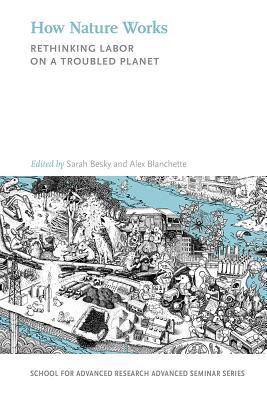

 University of New Mexico Press
University of New Mexico Press
How Nature Works: Rethinking Labor on a Troubled Planet


Key Metrics
- Sarah Besky
- University of New Mexico Press
- Paperback
- 9780826360854
- 8.98 X 6.37 X 0.76 inches
- 0.9 pounds
- Social Science > Human Geography
- English
 Secure Transaction
Secure TransactionBook Description
We now live on a planet that is troubled--even overworked--in ways that compel us to reckon with inherited common sense about the relationship between human labor and nonhuman nature. In Paraguay, fast-growing soy plants are displacing both prior crops and people. In Malaysia, dispossessed farmers are training captive orangutans to earn their own meals. In India, a prized dairy cow suddenly refuses to give more milk. Built from these sorts of scenes and sites, where the ultimate subjects and agents of work are ambiguous, How Nature Works develops an anthropology of labor that is sharply attuned to the irreversible effects of climate change, extinction, and deforestation. The authors of this volume push ethnographic inquiry beyond the anthropocentric documentation of human work on nature in order to develop a language for thinking about how all labor is a collective ecological act.
Author Bio
Sarah Besky is a cultural anthropologist and Associate Professor in the ILR School. Her research uses ethnographic and historical methods to study the intersection of inequality, nature, and capitalism in the Himalayas. In her work, she analyzes how materials and bodies take on value under changing political economic regimes, and she explores the diverse forms of labor that make and maintain that value. Articles on these questions have appeared in Cultural Anthropology, American Ethnologist, American Anthropologist, Comparative Studies in Society and History, Antipode, and Environmental Humanities, as well as other interdisciplinary journals.
Her first book, The Darjeeling Distinction: Labor and Justice on Fair-Trade Tea Plantations in India (University of California Press, 2014) explores how legacies of colonialism intersect with contemporary market reforms to reconfigure notions of the value of labor, of place, and of tea itself. Her second book, Tasting Qualities: The Past and Future of Tea (University of California Press, 2020) blends historical and ethnographic research on science, value, and the idea of quality in the tea industry to analyze efforts at economic reform in India. Another book, How Nature Works: Rethinking Labor on a Troubled Planet (SAR Press, 2019), a volume Besky co-edited with Alex Blanchette, brings together contemporary theoretical conversations in posthumanism with classic and continually relevant questions about political economy, precarity, and the meanings of work.
Her new research explores the intersections of agricultural extension and experimentation, colonial and postcolonial governance, and the everyday productive and reproductive work of farming in the Himalayan region of Kalimpong, West Bengal.
Source: Cornell University, ILR School
Videos






Community reviews
Write a ReviewNo Community reviews